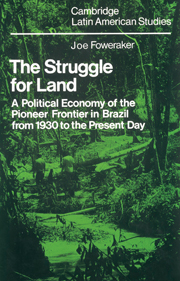 The Struggle for Land
The Struggle for Land Book contents
- Frontmatter
- Contents
- List of maps
- Preface
- Glossary of acronyms and abbreviations used in the text
- Glossary of words and phrases in Portuguese used in the text
- 1 Brazil: political and administrative divisions
- 2 Principal frontier regions
- 3 West Paraná: estates and municipalities
- 4 South Pará
- 5 South Mato Grosso
- Part 1 The pioneer frontier
- Part 2 Political mediation
- 4 The legal history of the land on the frontier and the question of dual authority
- 5 Law and lawlessness on the frontier and the problem of bureaucratic inertia
- 6 Private and public colonisation of the frontier and the pattern of bureaucratic entrepreneurship
- 7 The contemporary alliance of state and capital on the frontier and the contradictions within the State
- Part 3 Accumulation and authoritarianism
- Bibliography
- Index
- CAMBRIDGE LATIN AMERICAN STUDIES
6 - Private and public colonisation of the frontier and the pattern of bureaucratic entrepreneurship
Published online by Cambridge University Press: 29 October 2009
- Frontmatter
- Contents
- List of maps
- Preface
- Glossary of acronyms and abbreviations used in the text
- Glossary of words and phrases in Portuguese used in the text
- 1 Brazil: political and administrative divisions
- 2 Principal frontier regions
- 3 West Paraná: estates and municipalities
- 4 South Pará
- 5 South Mato Grosso
- Part 1 The pioneer frontier
- Part 2 Political mediation
- 4 The legal history of the land on the frontier and the question of dual authority
- 5 Law and lawlessness on the frontier and the problem of bureaucratic inertia
- 6 Private and public colonisation of the frontier and the pattern of bureaucratic entrepreneurship
- 7 The contemporary alliance of state and capital on the frontier and the contradictions within the State
- Part 3 Accumulation and authoritarianism
- Bibliography
- Index
- CAMBRIDGE LATIN AMERICAN STUDIES
Summary
In explaining the process of frontier expansion, the emphasis has rightly been placed on spontaneous migration to the frontier, rather than on planned colonisation of the frontier. The pioneering movement is primarily determined, as was argued in Chapter 3, by the ‘surplus’ of labour and monopoly of land in the countryside, and by the rising demand for staple foods in the cities. Planned colonisation appears to have contributed little to the movement, not because plans for colonisation were lacking, but because most such plans, both public and private, met with failure. Public planning of colonisation has recurred throughout the period of the pioneer frontier, with occasional concerted efforts to direct the pioneering movement, such as the series of incentives to colonisation provided by Vargas under the Estado Novo, which were heralded collectively as ‘The March to the West’ (Esterci 1972). But of the tens of national colonies inaugurated in the years following the collation of this legislation in 1945, only one or two managed to survive and prosper (Diegues 1959), which is indicative of the small success of public colonisation initiatives over the period. Such public policies necessarily obeyed political imperatives, such as ‘peopling the political boundaries of the nation’, and therefore the collapse of most of the colonies may be explained by a lack of any economic viability. But private colonisation plans, which in principle should respond to clear economic incentives, appear to have met a similar fate.
- Type
- Chapter
- Information
- The Struggle for LandA Political Economy of the Pioneer Frontier in Brazil from 1930 to the Present Day, pp. 128 - 149Publisher: Cambridge University PressPrint publication year: 1981


